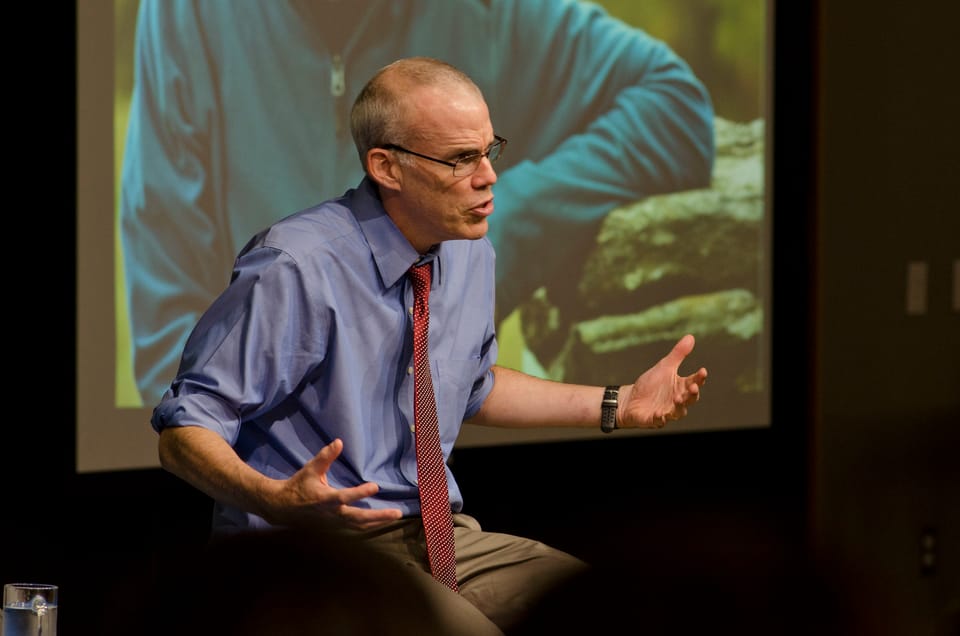Bill McKibben on 'radical libertarianism' in NH and the climate crisis

The Bulletin spoke with author and environmentalist Bill McKibben about the climate crisis in New Hampshire, the state’s role in addressing it, and why he believes biomass is a dumb way to do it.
McKibben lives in Vermont and has written extensively about climate change for the New Yorker, the Guardian, and the New York Times. He is the author of 20 books. On Tuesday, he traveled to New Hampshire for a fundraising event hosted by the League of Conservation Voters, an environmental advocacy organization with a chapter in New Hampshire.
This interview has been edited for length and clarity.
What do you think are the most pressing environmental concerns facing New Hampshire and the region more broadly?
The most pressing of all environmental concerns by far is the climate crisis. What that really means is the need to transform our energy systems. I think the thing that really is facing New Hampshire but most other places, too, right now is a need to start implementing change fast.
There’s a lot of money in this new federal bill, the Inflation Reduction Act, for cities and states to make huge changes: to build out EV charging systems, to subsidize electric heat pumps for their citizens, you know, on and on and on. But it’s going to take willing partners in state houses around the country for that to really work. New Hampshire has a lot to gain from all that. But it’s going to require not having doctrinaire ideological conservatism get in the way at the State House.
Given this unprecedented federal spending to address climate change, what role should states play in combating climate change?
The states are one step closer than Washington to the ground. So, you know, what states need to do is be an efficient transmission mechanism for that kind of funding to make it work efficiently and practically. It’s not that much different from what states had to do with COVID. They didn’t have to invent the vaccines, but they had to figure out how to set up the systems to deliver them to people. And so with solar panels and EV chargers and things, too.
Some key Republicans pronounced 2023 the year of biomass. Gov. Chris Sununu has said he won’t support more subsidies. You’ve written extensively about why biomass is a bad deal when it comes to climate change. What’s the harm in New Hampshire turning back to its biomass plants?
It’s just a dumb way to deal with climate change. We used to think – we’re talking 15 or 20 years ago – that because a tree eventually grows and soaks up that carbon, that it makes it in some sense OK to burn biomass. But in fact, burning wood is very inefficient. You put a big pulse of carbon into the atmosphere right away. Given the fact that we’re breaking the climate system right now, it doesn’t really do you much good the fact that 50 years from now it may get sucked up again by a tree.

So the science has turned sharply against biomass indeed. It’s become clear, and I wrote a long piece for the New Yorker earlier this year, that our essential job is to just stop burning things, period. Not coal, not gas, not oil, not biomass – reliance instead on the fact that there’s a very large bottle of burning gas hanging in the sky about 93 million miles away, and now we know how to use it. So why wouldn’t we?
Some of the effects of climate change are already here in New Hampshire. We’re seeing our snowpack diminishing, the drought that we’re experiencing, the impact of flooding and sea level rise on the Seacoast. Younger generations are already reckoning with this and what the climate change future might look like. On the flip side, there are projections that New Hampshire and the Northeast in general could become a destination for climate migrants. What’s your outlook about what we’re doing now to combat climate change and how that sets up the region for the future?
I do think that there’s every reason to expect that over time there will be climate migrants here, and I don’t think that we’re particularly well positioned to deal with them yet. We should start thinking about that. The key job in the short run, i.e. over the next five or six years, the job that scientists have basically assigned us is to very quickly replace our current energy system.
In New Hampshire the sort of symbol of the old energy system is the plant in Bow, burning coal like it’s the 18th century. And the new energy system is going to be offshore wind. It’s going to be a huge industry here. Making that switch happen fast is what we really want to do because speed is the issue. The planet is breaking down before our eyes. You can tell by looking at Pakistan, by looking at Southwest Florida, by looking at a thousand other places around the world right now.
Do you feel optimistic about our ability to make the kind of changes that are necessary to stave off the worst effects of climate change?
I feel like we’re starting to do some things that we should have done long ago. But I don’t feel like we’re doing them fast enough yet. I think the next couple of years will be really key. The federal government has finally spoken and for the first time passed a serious climate bill. And now its execution and implementation are the main things from this point on.
Some New Hampshire citizens and elected officials reject climate change science. Do you think that is a problem when it comes to passing measures to combat climate change?
It’s clearly a big problem in New Hampshire. New Hampshire hasn’t done what other states have done, and I assume that one reason is that set of prevailing ideas among too many in the political class. It’s a shame because the problem is not conservatism. Any actual conservative would be heavily engaged in trying to preserve the climate of the world as we knew it.
I think a kind of radical libertarianism posits the idea that markets are the answer to all questions.
I think of myself as deeply conservative in that sense. I like the world that I was born into with some ice on the poles and the coral reef in between. The problem is sort of radical ideologies, especially in the case of New Hampshire, I think a kind of radical libertarianism posits the idea that markets are the answer to all questions. Well, if markets were the answer to this question, the North Pole wouldn’t have lost half its sea ice in the last three years.
This story was produced by the editorially independent New Hampshire Bulletin, which is part of States Newsroom. Contact Editor Dana Wormald for questions: info@newhampshirebulletin.com.
